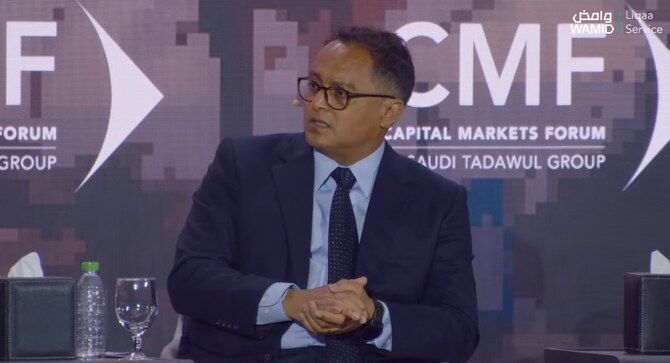RIYADH: Accessing and interpreting data effectively is crucial for investors’ success in capital markets, as it enables them to make informed and timely decisions, according to experts.
During a panel discussion at the Capital Markets Forum in Riyadh on Feb. 18, industry specialists said that real-time data availability is equally crucial for other participants, such as brokers, asset managers, and external institutions.
“What I believe is that data is the new alpha. So, those who master it will not only participate or win in the market, but they will define the market,” said Mehdi Miri, CEO of DirectFN.
He added: “For investors, data is really about making smart and fast decisions. What investors need to see today is real-time AI-powered data that will help them look into insights and foresight so that they can see market opportunities before the market moves.”
Miri further said that brokers and banks are using advanced analytics to build their trading and hedging strategies, ultimately improving their execution process.
Yazeed Al-Domaiji, CEO of Wamid, a subsidiary of Saudi Tadawul Group, highlighted the importance of accessing data while maintaining rules and regulations.
“Capital markets are driven by data. Data is there from more than 100 years ago. Everybody in capital markets is looking for data, using data to make decisions. As a capital market institution, it is necessary to find the balance of how we can innovate while maintaining the regulations,” said Al-Domaiji.
He added that Wamid is aiming to play a major role in enabling the capital market industry in the Kingdom as it has announced a recent partnership with Google, with Saudi Arabia having strategic plans to adopt data and artificial intelligence in the sector.
Al-Domaiji said that Wamid is encouraging innovation in the capital market by focusing on two pillars, including data solutions and infrastructure technology.
“In data solutions, we announced our partnership to launch our project for the data terminal. What we are planning to do is to offer a set of data that suits the demand of the market. We are focussing on satisfying the issuers, the capital market institutions, and the investors through a series of data with easier accessibility and good quality,” said Al-Domaiji.
He added: “On the infrastructure side, we are helping the capital market to increase the access of institutional investors, especially for the HFTs (high-frequency trading). So, today, in Saudi Arabia, HFT trading is around 25 percent of the daily average trading.”
Miri further said that data has become a strategic asset over time, and it is not just a global trend but a local and regional reality.
“Data is a strategic asset. When we talk about monetization, data is a business in itself. This is a Spotify moment for data, where we are bringing and converging raw data into an on-demand revenue-generating machine,” added Miri.
He said the capital market currently demands data that are not just numbers but enriched pieces of information, which should give foresight on what to do next.
Miri also underscored the vitality of personalizing the data and integrating them into one single platform for better efficiency and quick decision-making.
Regarding the future outlook of the importance of data in capital markets, Miri said: “Further down the road, if you have the data and if you have the liquidity, this could be the new asset class. A few decades ago, no one was thinking about carbon trading. In the future, we will be talking about data trading. Obviously, we have to balance it with data protection and regulation.”
Underscoring the importance of datasets, Al-Domaiji added that data will become the “new currency for the capital market” in the future.
Doug Peterson, special adviser and member of the board of directors at S&P Global, stressed the importance of data privacy and said: “The first question you have to ask from a governance standpoint is how I am going to protect my data. Do you want your data to be the one that is used in a model that is being built? Once it is there, that model is going to be using your data forever, and you are going to get paid for it.”
He added: “I am really encouraged by what is happening in the Saudi market. We are very pleased at S&P Global to start building the local presence, because we think this is one of the most important markets in the future.”
Katharine Furber, global head of emerging markets trading product at Bloomberg LP, said that fixed income space is seeing huge potential in the usage of data.
“In the fixed income space, of course, it is the sell side indication, which indicates the desire to buy or sell a bond. But also trading data, and by trading data, I do not just mean what did they trade at what price. They want to build a rich story around the trade to learn as much as possible, which includes how many counterparties they asked on the trade; whether or not those counterparties responded to the trade request,” said Furber.




















